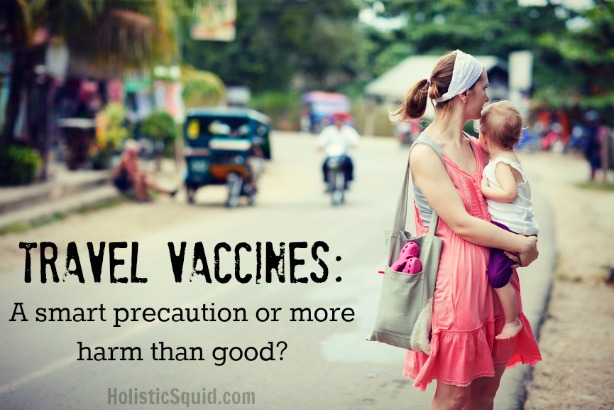
Recently my family and I traveled the world for nine months. Because of this, you can bet I have done my research when it comes to travel vaccines, and here's what you need to consider…
If you've been reading Holistic Squid for a while, you may be surprised to learn that I don't live in the anti-vaccine camp. I do, however, feel that we need more information and consciousness before we just nod our heads to a battery of syringes filled with microbes and chemicals that often are doing more harm than good.
Though I find the instances to be increasingly rare, there are times when a vaccine may be a good idea – and foreign travel may be a good time to consider immunizations from strange and deadly diseases.
3 simple steps to deciding about travel vaccines
In his book, The Vaccine Guide, my colleague Dr. Randall Neustaedter, explains how to decide which travel vaccines make sense for you and your family.
- Figure out what illnesses you're at risk of catching in the specific area(s) you will be traveling. Certain countries require proof of vaccinations for entering, but most countries only recommend certain vaccines and do not actually require them. For official, up-to-date information check the official CDC recommendations here as well as a non-government site like TripPrep.com.
- Consider the likelihood of you catching an illness vs. the potential side effects of its vaccine. There is no point in getting a vaccine that is not needed, especially if there may be side effects. Do the risks of the illness outweigh the risks of the particular vaccine? This may vary depending on who may be getting the shot – children, pregnant women, and others with weakened immune systems should get special consideration.
- Examine the efficacy rate of the vaccine in question. Consider if the vaccine's efficacy is high enough to risk the side effects from it's associated vaccine.
Pretty simple. What can you catch? How likely are you to catch it? What is the efficacy and side effects of the vaccine in question? Weigh it out, add it up, and your decision should come into focus with more ease.
Where in the world?
Not every exotic destination warrants the need for inoculation, but there are certain areas of the world where your risk of exposure to illness is increased including underdeveloped parts of Latin America, Africa, and Asia. Studies show that your risk increases even more if you are exposed to rural areas that are off the usual tourist routes for extended periods of time.
Most illness experienced by travelers comes through exposure to contaminated water or transmission by a mosquito, so you need to consider the following factors: Will there be purified water available where you are staying? Will you be exposed to exotic animals or agricultural areas? How long will you be staying? Are you an adventurous eater? What will the sleeping conditions be?
While 50-75% of travelers to high-risk areas report experiencing some sort of health problem, less than 5% seek medical attention, and less than 1% require hospitalization. The rule of thumb: The more adventurous and off-the-grid you plan to travel, the more precautions you may want to take. (source)
Three common travel vaccines to consider
Let's have a look at Hepatitis A, typhoid, and yellow fever, which are often up for consideration when it comes to travel vaccines. Clearly this short list is not exhaustive, so be sure to use the three simple steps at the beginning of this post when considering what you may want to immunize against before traveling.
Hepatitis A
Hep A is a viral infection that affects the liver, but it is rarely fatal and does not cause chronic illness. It is most commonly acquired by ingesting contaminated water, ice or raw foods.
The side-effects of the Hep A vaccine are rare but serious, and children under 12 months cannot receive this vaccine. An alternative is to get an immunoglobulin (IG) shot which carries less risk, and has shorter but more successful efficacy than the vaccine. The IG will be effective immediately, lasts up to 4-6 months, and is safe enough to administer to infants.
Whether you decide to vaccinate, get the IG, or skip both of these measures, it is essential that you adhere to the following rules when Hep A is a travel risk: Drink water that is bottled or boiled – including ice in your drinks and the water you use to brush your teeth. Peel fruit yourself, and avoid raw foods or unsanitary street vendors.
Typhoid
Typhoid is an illness contracted through water that has been contaminated by sewage. Symptoms such as high fever, weakness and stomach pains can result, but it can be treated with antibiotics, and death from this disease is rare unless left untreated. Typhoid is most frequently acquired in underdeveloped tropical areas of Latin America, Asia and Africa.
The efficacy of the typhoid vaccine has proven disappointing with studies showing a success rate of 60-70% at best. If you use the same precautions listed above for avoiding Hepatitis A, you may decide to skip this vaccine, especially since it responds so well to antibiotics if illness should occur. (source)
Yellow Fever
Yellow fever is a very serious viral disease that can be transmitted through humans and/or monkeys via mosquitoes. Yellow fever can be fatal if left untreated.
Although this disease is very rare in travelers, flu-like symptoms accompanied by nosebleeds and rashes followed by jaundice, bleeding and death, are a great argument for vaccination if you are traveling in tropical areas of sub-Saharan Africa or South America and Panama.
Over 100 countries require proof of vaccination for yellow fever before you can enter – including for layovers longer than 12 hours, so be sure to check the latest list of current requirements for yellow fever vaccinations before you travel. A medical exemption is available for those with an allergy to eggs or any immunocompromised condition.
Though the risk of contracting yellow fever is quite small – especially for travelers, up to 90% of non-immunized travelers that are infected with yellow fever will die. Studies of the vaccine indicate efficacy from 75-95%, and while serious side effects have been reported, they are rare. (source)
Rather than freak out over every little mosquito bite, or cover yourself head to toe with DEET, it may be wise and far less hassle to vaccinate if you will be traveling in areas where the vaccine is required. For those who are medically exempt, the homeopathic nosode for yellow fever has historically proven to be an effective alternative. Consult with a qualified homeopath if you are interested in exploring this option.
Traveling with kids – special concerns to budding immune systems
The delicate and inexperienced digestive and immune systems of children are at greater risk of illness during travel, and are more apt to need hospitalization if they become ill. However, they are also more apt to have reactions to travel vaccines as well.
To best protect your child’s immune system, it’s probably ideal to limit international travel under the age of 1 year, and to avoid travel to high-risk areas.
For children over 1 – who have demonstrated good health and a strong immune system – the decision should be made on a case-by-case basis. If you are traveling to areas of the world that may pose a risk of infection, take extra precaution in considering the risks of exposure vs the risks of the vaccines, and only vaccinate if and when your child is strong and thriving.
Whether or not your child has been vaccinated, it is important to consider environmental risks that they may encounter. A common way that children acquire illness is through swimming in contaminated bodies of water, eating raw fruits and veggies, and drinking local water.
For kids and adults alike, even if you're vaccinated, don't throw caution to the wind. No shot is 100% effective and foreign travel will always be a tax on your system, because the microbes you encounter are new and foreign to your immune system.
With a little thought and preparation, the right remedies on hand during your trip, and a dash of luck, you might just have an illness-free adventure.
Got an experience or opinion to share about travel vaccines? Please share below!
Be sure to check out next week's post: How to Stock Your Holistic Travel Remedy Kit – where I'll cover everything from supplements to pack when visiting grandma's house to homeopathic nosodes to protect against exotic travel bugs.
For more information about travel vaccines and vaccine decisions in general, I highly recommend that you read The Vaccine Guide by Randall Neustaedter, OMD, which has been the main source of reference for this post. The Vaccine Guide provides a unique and deep perspective into the often over-whelming and confusing decisions about vaccines.












I appreciate the balance with which you approached this. I have been thinking about this subject as we have 2 little ones and love to travel. Thanks!
Yes, Fantastic. Thank you so much, this is something that has been a concern for me. Since I became educated about vaccines I’ve avoid them for our family. But we do travel yearly overseas to third world countries and have small children. This is very informative and honest.
Do you take any sort of medicinal (natural or otherwise) precautions when traveling to those countries, with or without kids? We’re looking into this and have a young child, so I’m curious.
Hi Alena
So far I’ve only taken extra probiotics for the family and while while we travel in addition to activated charcoal. However, this article has led me to the right resources for me to do research on what we are exposed to in each country. I will be adding to our travel kit thieves oil, oregano oil, and stronger probiotics to carry with us at all times during travel. We have two big trips comming up, one to Colombia (South America) and one to actually move to Japan, based on the importance of the diseases for both of these countries I will considered the vaccines; but I also want to talk to our naturopath about it.
Just the post that I was looking for. My girlfriend and I are travelling the world while working online and we have discussed what to do with vaccines. What to get and what not to get.
In the old days I was 100% pro vaccines, now I try to look at the side effects on vaccines. I will definitely try to do the things that you mention. It seems like a good strategy.
I connot speak much to vaccines as I have traveled all around the world and never blinked about getting the recommended vaccines before going. I have recived the normal shots of the heps etc. , plus oral typhoid, and Japanese ensephilitis. No notable side effects but I will make a note about malaria medications. Having traveled around SE Asia and having lived in Nepal for some time, I have been on my fair share of malaria pills. I would strongly advise researching different options and requesting certain medications from your doc./travel clinic. There are malaria pills that will make you sensitive to the sun, make your birth control ineffective, cause weight gain, cause hair loss, and cause insomnia among other problems. One common malaria drug also happens to be a common drug used to treat acne. There are a few good ones out there that while more expensive (depending on your insurance) have far fewer side effects. I can’t recall the exact names, but do you research! It is worth it to be informed when there are so many options and so many outdated meds.
My husband and I had a slew of these before doing an around the world trip in 2011. They were really expensive and in the end I felt like we really didn’t need them all – after all, the most “exotic” places we visited were Bolivia and Jordan. I don’t think there was any risk at all in the end. And this was before we knew about all the garbage in vaccines and the fact that we both have multiple MTHFR gene mutations. It’s not like the doctors giving them are going to say “no, don’t bother.” Great advice and yes, definitely consider the risks versus the benefits. I’m now more well-travelled and unless you’re going to remote, jungle areas or places where these diseases are actually a problem, I would skip it. Also be sure you need malaria pills before taking those…I’ve heard lots of side effects and some people cannot tolerate them at all.
This is good, calm advice. I spent six months in Zimbabwe when I was in college and before I went I was injected with everything under the sun (my very loving mother was very nervous, bless her). Fortunately I have never experienced many negative side effects to vaccinations. Also had to have a chest x-ray (to prove I didn’t have tuberculosis, as they won’t not have let me enter the country if I did) and was require by my program to take anti-malaria medication (as nasty as it is, I do recommend some kind of precaution against malaria because it is my understanding you can never get rid of the disease once you’ve been infected). Then I went to Sri Lanka for three weeks about four years later and completely forgot to investigate any necessary vaccinations before I went (and was allowed into the country). When I was both vaccinated and not, I never contracted anything serious since I followed the basic guidelines of drinking bottled or boiled water, peeling fruit (or washing with bottled water) and avoiding swimming, wading, etc. in natural waters. I agree with Emily on the Yellow Fever vaccination – there are times when a vaccination really is the best route to go, considering what the alternative is, even if the chance of contracting it is relatively small. My two cents is to not get cocky and think you will beat a germ (that was my attitude when I went to Sri Lanka – I tried to play it smart and got lucky). We all want good memories from our international experiences for ourselves and for our families. While I’ve been fortunate enough to have never suffered anything beyond the typical intestinal distress common to acclimating to a new environment, I have witnessed several people in my travel groups, people who were also cautious and mindful about their health, get very sick (one young woman contracted an intestinal parasite and it took 4 years to clear it from her body and she comes from a family of medical professionals). Do your research, decide what level of risk you are prepared to welcome for yourself and your family, own your decisions, and don’t judge others for making different decisions.
Dear Cuttles (lol),
I have travelled all over the world, never had ANY vaccinations, nor would I ever even consider it. There is more at stake than just your health, although, I would think that would be of major importance. In addition, vaccine “science” has NEVER been proven, and the risks make the “possible” projected “benefit” a rather poor decision. Suggest you, and your readers watch these videos…
http://www.youtube.com/watch?v=YuDvRSvyz5Y
http://www.youtube.com/watch?v=K1m3TjokVU4
I did a lot of research on the Yellow Fever vaccine before we went to Brazil. We were going to be there for 3 months with our 4 and 2 yr old, and staying among Amazonian tribes for part of the time (SUPER COOL!). In that particular region though, less than 5 un-vaccinated travelers had contracted YF in the last 50ish years, and more people had actually died/had bad side effects from the vaccine than the disease! So, we skipped it. I’m SO interested in the homeopathic nosodes and just finished reading The Solution, which explains them in detail. We are seriously considering going that route for vaccines on the whole. Thanks for posting and I’m looking forward to your travel kit post!
It is so refreshing to read a balanced outlook on vaccines. I couldn’t agree more.
My brother just came home from 2 years in Brazil (São Paulo). Before he went is was vaccinated (including yellow fever) When he had been there about 6-12 months he was sick. Shortly after discovered his eyes and skin were yellow. Went to several doctors; ruled out hepatitis and tried to tell him it was his diet. Never addressed yellow fever with him. He just got home and went and saw doctors here in the US where they confirmed he had yellow fever :-/ We’re all just so thankful that he was ok.
Papaya leaf tea/enzymes for malaria every day. It will prevent or cure
Hep A vaccine is usually given to kids between first and second year. In your article its says that its not administrated before 2 years.
Hi lana, thanks for pointing that out. I have updated the post to reflect this.
There can be no health found in vaccines-none. Build the immune system, know the diseases to be aware of and cater your nutrition accordingly. Vaccines over stimulate the immune system and brain-quite often not even proving immunity-no to mention spreading the live vaccine viruses. Injecting the toxins, chemicals, neurotoxins, carcinogens, human and animal and plant DNA, and dead or live viruses WILL NOT PROTECT only DESTROY-especially young children. Research ingredients and growth mediums. Vaccines are cheating nature and nature cannot be cheated. Great places to research are Dr. Russell Blaylock, Dr. Sherri Tenpenny, Dr. Susan Humphries, Dr. Tetyana Obukhanych…pay attention, the “quacks” are stacking up.
Hi there. Although from the US, We’ve lived in Indonesia for the last 3 years and travel frequently with our 2 children ages 8,10.
Before that we lived in Eastern Europe.
We’ve made different decisions regarding vaccines than standard protocol. While I do slowly vaccinate my children, I research which brand and batch is being used, what’s in each one and try to supplement accordingly to help their bodies detox some.
No, it’s not perfect science, and we don’t get every suggested vaccine. To be honest, if we lived in the States I’d more heavily lean to not fully vaccinating. However, when you live in developing countries, travel frequently, are exposed to a wide variety of immune system compromising situations, we decided to err on the side of caution. Sometimes you can’t avoid street food or questionable water or hygiene standard when you travel… In general We try eat healthy, take probiotics and use caution… but short of putting our children in bubbles, they will be exposed to a variety of diseases not common in the US
We did not, for instance vaccinate for TB, although both countries we’ve lived in had high rates of TB. We chose not to vaccinate for rabies although wild dogs were plentiful in the country we lived in Eastern Europe. But we did vaccinate for Hepatitis…
I’m not pretending at all my way is best. I think each person has to research, pray and make the best decision you can given the available information albeit incomplete and imperfect.
We now live in a very very dengue prone area. I refuse to spray our yard or use DEET on the kids opting for essential oils as a deterrent. I open windows and we sit out in the evening (no, we don’t run with scissors too ????) Thus far- no dengue- yet many friends and neighbors have gotten it- Is my method working? Perhaps or perhaps it just isn’t our time.
I appreciate your balanced approach.
My husband works in international aid a development and reminds me children still die from many diseases we vaccinate for in the US… He’s much more pro vaccine than I am- but then again, he’s seen some things first hand. So no answers from me other than research, eat healthy, supplement, detox and pray that your decision to vaccinate or not is the best one you could make given your circumstances.
I just wanted to share my story about travelling to Thailand. It was about 10 years ago, when I was in my mid-20’s travelling with a friend in his mid-20’s. We both got vaccinated at suggestion of our docs at the time. With what you may ask? Well I don’t know, because at the time it didn’t occur to me that vaccines have any side-effects, so it didn’t occur to me to ask what I was being injected with and for. We were vaccinated right before, and on the last day of our 3 week trip, my friend (who was a fit athlete with no health issues) woke up sounding very funny. It took us much Google searching that day to figure out that his vocal cords were likely paralyzed and he might have Guillain Barre. He was hospitalized in the ICU immediately on our return, because he did in fact have it. It’s an autoimmune disease that’s listed on many vaccine inserts. At the time, we thought, wow how odd that he would get such an obscure disease!! Only years later did I realize that it may have been connected to the vaccine. And what leaves me unsettled now is that not one of his doctors suggested it, and it was certainly not reported anywhere. Just wanted to share…
Where can you buy the Yellow Fever Nosode?
Hi Richard, thank you for your question. You can get the Yellow Fever nosode from a qualified homeopath. xoxo Emily